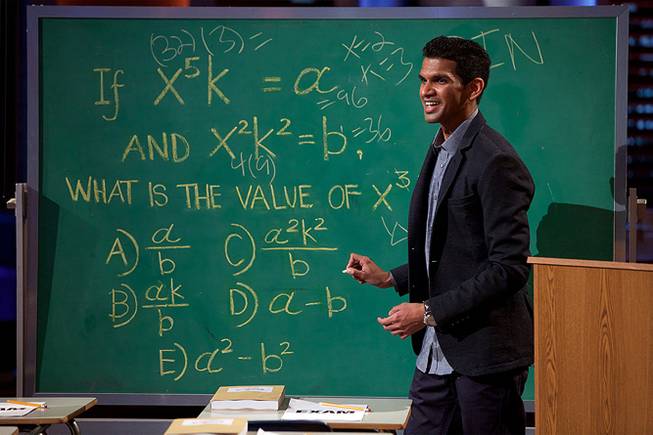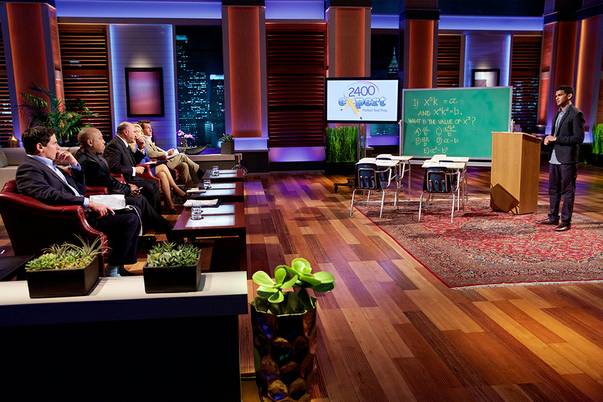
Disney | ABC Television Group
College student and entrepreneur Shaan Patel of Las Vegas delivers a pitch on an episode of “Shark Tank,” which airs Friday, Jan. 29, 2016 on ABC.
Friday, Jan. 29, 2016 | 2 a.m.
Nobody told Shaan Patel why people rented rooms by the hour at the Sky Ranch Motel, his childhood home until he was 15 years old.
But Patel knew.
"At a young age, you figure out why pretty quickly," he said.
The Sky Ranch, located on a gritty stretch of Fremont Street on Las Vegas' east side, drew a cast of characters that included drug addicts and prostitutes. Patel was fortunate. He was not a Sky Ranch Motel guest but lived in a room there — not far from the establishment's neon-colored sign, where a yellow half-moon shone day and night — because his parents were the owners.
And despite a chaotic environment of maintenance calls and bells ringing at all hours, he said that when he went away to USC for college, he appreciated what he learned by living there. He fondly recalls basketball in the parking lot with several friends whose parents also owned motels on Fremont. Sometimes the guests would join the games. He remembers playing with a frequent motel guest who Patel describes as “cool” and a “great person” but also an "example of how your life can go wrong."
“It helped me empathize a lot,” he said.
Patel recognizes he was fortunate in another way: His parents made education a top priority. His dad had emigrated from India where he grew up in a town where most people did not have a formal education, Patel said. His father was different. Through a connection, he was able to earn an education, eventually going to college and pharmacy school. His dad never forgot the difference it made.
“It had to do with his own experience,” Patel said of his father's emphasis on education.
Now, years after moving away from the Sky Ranch, Patel is a college student and entrepreneur who will appear tonight on the ABC reality TV show "Shark Tank."
His pitch for the show has roots in his high school years, when he earned a perfect SAT score of 2400. His method for how he did it, something only a couple hundred test-takers do each year, is what Patel eventually capitalized on and converted into a national company, 2400 Expert SAT Prep. That turned into a book published by McGraw-Hill.
And at 9 tonight, the company makes its debut on "Shark Tank," in which entrepreneurs present businesses to a panel of investors, like Dallas Mavericks owner Mark Cuban and fashion entrepreneur Daymond John, in hopes of getting funding.
Under his contract with the show, Patel cannot disclose whether one of the investors offered to back his company. Either way, he said the appearance would provide a boost.
“The publicity of 'Shark Tank' is probably worth more than a deal,” he said.
Regardless of the outcome, though, the show won't make or break Patel. As well as being a businessman, Patel wants to be a doctor. The Clark High School valedictorian is in the process of completing a business degree at Yale, earning that degree before he finishes his final year of medical school at USC, where he received a full-tuition award as an undergraduate.
Patel stresses how much a perfect score set him on his course. In addition to the USC scholarship, companies like Coca-Cola and Toyota granted awards for his college expenses. He got admission offers from top universities, including Brown, Northwestern and John Hopkins.
“It really changed my life,” he said during an interview at a Starbucks not far from Clark High.
It wasn't easy, though. Patel said the first time he took the SAT, he missed the perfect score mark by about 700 points. “That’s when I started studying hundreds of hours for the SAT,” he said, taking several practice exams and memorizing vocabulary lists.
After studying his way to a perfect score, he wanted to write an SAT prep book to help others do the same. In college, he reached out to hundreds of literary agents and was rejected by nearly all of them. With no publishers jumping at his pitch, Patel decided the summer before he left for medical school, he would earn extra money using his techniques to teach classes in Las Vegas.
“I never had any plans bigger than that,” he said.
But those first two classes, which drew about 18 students and were taught out of a co-working space in Henderson, were so successful that parents were calling him to teach more. The only problem: Patel was headed off to medical school and couldn't do both.
Instead, in 2011, Patel hired several instructors to teach the classes for him. That’s when the business began in earnest, and it’s only grown since then. It’s done about $1.5 million in sales in Las Vegas and online. And Patel is eager to expand it. The company is launching in more than a dozen cities this weekend, including Los Angeles and New York. It has the resources to do about 30 classes right now, but Patel wants to push that number past 100 by the end of 2016.
Despite juggling business school and medical school, Patel is still actively involved in the company. So much responsibility rests on Patel, he said some of the “Shark Tank” investors were concerned about what might happen to the firm were something to happen to him.
There are obstacles to the company's success, and Patel recognizes them. For one, the SAT Prep market, with big players like Kaplan and Princeton Review, is crowded. What differentiates his company, Patel argues, is that it’s crafted as a course from the student’s perspective and has produced tangible results. He said the average score increase, by the end of his courses, is about 368 points.
During his appearance on "Shark Tank," he pitched for about 90 minutes for a segment that will be condensed to 10 minutes. But Patel said he was grateful for the opportunity. He plans to watch the episode with a large group in Clark High School's theater.
“You basically have the attention of 7 million Americans for 10 minutes,” Patel said, adding that the equivalent amount of commercial time would cost many millions. “No one can ever do that.”


Join the Discussion:
Check this out for a full explanation of our conversion to the LiveFyre commenting system and instructions on how to sign up for an account.
Full comments policy